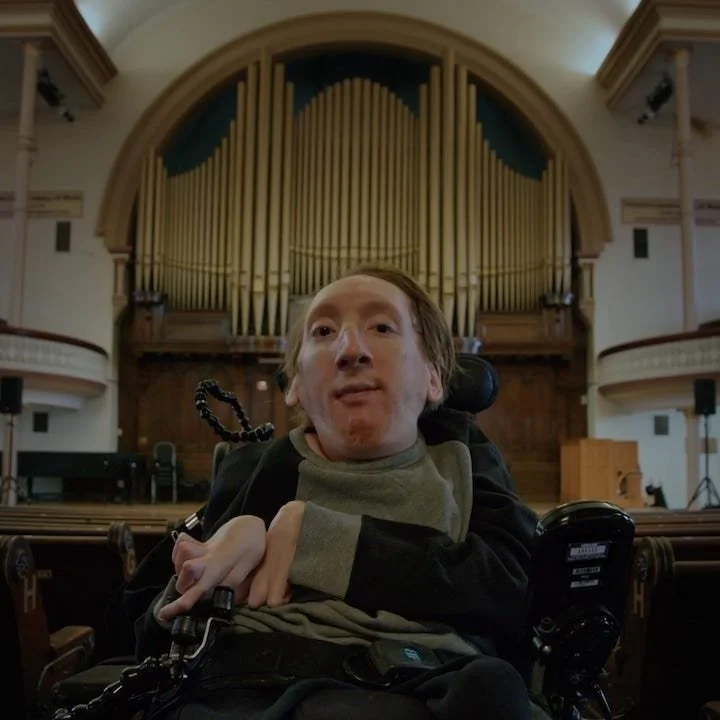VIFF opener Ari's Theme brings lifelong dream to fruition, with live-performed score
Vancouver Island’s Ari Kinarthy wrote the score and stars in a screening event that memorializes his life
Ari's Theme features dream and magic-realist sequences.
Ari’s Theme opens the Vancouver International Film Festival on September 26, with additional screenings September 28 at the Vancity Theatre (1:30 pm) and 30 at at the Lochmaddy Theatre (1:30 pm)
ARI’S THEME IS much more than a documentary screening; it is a performance, a legacy, and an epic mission accomplished.
The movie, which opens the Vancouver International Film Festival, centres on Ari Kinarthy, a composer whose progressive spinal muscular atrophy has made him, at 34, acutely aware of the passage of time. As a movie fan inspired by John Williams, he long dreamed of scoring a film that would live on long after he is gone. And now, with seasoned Vancouver documentary-makers Jeff Petry and Nathan Drillot (who work under the name SALAZAR), that fantasy has come true in ways he could never have imagined.
Ari’s Theme not only features an expressive orchestral score composed by Kinarthy, it tells the story of his life that inspired the music. And for VIFF, that music will played live by eight musicians from the Vancouver Symphony Orchestra—an event for which the artist says he has “no words”.
“I would say my biggest inspiration or motivation was to have my music installed in something else that lasts forever—be it a movie or a game or anything: if I could have a part of that, that was what was extremely meaningful to me,” Kinarthy tells Stir in a Zoom interview from his home in Victoria. “That was my dream. But never in a million years did I think it would be a film about me. That's just a cherished gift on top of it all.”
Kinarthy was involved in shaping Ari’s Theme from its first stages. In the winter before shooting, Kinarthy—who lives those months in isolation to avoid illness—shared his memories and stories with the filmmakers. Above all, as he explains in the documentary, he did not want the documentary to be a “pity party”. In one scene he’s triggered when someone remarks he’s accomplished “so much considering your challenges”.
“That made me worry that everybody’s going to focus on the challenges,” Kinarthy tells Stir. “I didn't want people to feel sorry for me and consider me the ‘composer with a disability’. That was an important process; we had a lot of conversations around that.”
To Petry, the goal was clear: Ari’s Theme was not going to be about disability, but about the journey of an artist. In fact, little time in the documentary is spent explaining the details around Kinarthy’s type 2 degenerative spinal muscular atrophy.
“It was a good opportunity for us to depict an artist going through all that entails: all the vulnerability, the self-doubt, and the questioning that goes on as you put something out to others,” Petry says, joining in on the call. “That battle of the artist wanting to give something of themselves, but simultaneously being worried that people won't like it or it won't be good enough.”
Interweaving a wealth of home movies, redramatizations, and even animated sequences, the artfully shot film traces Kinarthy’s life from a happy childhood with his loving family to using a wheelchair to get around and eventually losing the use of his hands. Hardships over time include the loss of his ability to operate a videogame controller that offers a world of freedom and social connection. But as he enters adulthood, Kinarthy finds new inspiration through computerized composition technology to create music.
Still, in Ari’s Theme, the exacting artist knows that he needs people who play instruments to help him fully realize the score—first with the help of music therapist Allan Slade, then securing Johannes Winkler, an Austria-based composer, multi-instrumentalist, and arranger, to bring his notes to life. In one of the most moving sequences, an ensemble of musicians perform Kinarthy’s work for the first time at Victoria’s atmospheric Conservatory of Music.
The documentary is far from just a straightforward recounting of Kinarthy’s momentous effort to create a cinematic score that will memorialize his own life. Inspired by the composer’s unusually detailed dreams, Petry and Drillot work several beautiful magic-realist moments into the film. In one key scene, sheet music circles Kinarthy in a tornado. In another, instruments magically lift from their stands and float around him—that coming directly from one of his recurring dreams about being able to move things with his mind.
“I don't really forget my dreams and they’re so vivid that I remember every detail,” the composer says. “Dreams only last a few minutes, but it feels like they last days or years sometimes. I can create a very complex story and I can remember everything that’s said.
“So dreams have been another world for me. I’ve always had a really deep imagination.”
Petry explains that one of the filmmakers’ biggest challenges was bringing Kinarthy’s vast interior life to the screen. The expansiveness of the composer’s inner world becomes even more fascinating when one considers his physical surroundings, by necessity, are often limited to a few rooms. A recurring image in the film is the windows that look out at the forest around Kinarthy’s home. They’re a symbol that he’s shut indoors, but also suggest potential—specifically, that art can’t be bound by walls, and that music will finally connect him with people in the wider world.
Conjuring his dreams and memories is one way that Ari’s Theme reveals Kinarthy’s inner thoughts. And over the course of the film, audiences are given access to a lot of what he has kept inside for decades—his deepest secrets, his anxieties, his sleeping problems, his fears after a serious brush with pneumonia. Occasionally, we also see his daily rituals: a care worker brushing his teeth, or the full-face oxygen mask he sometimes wears to sleep. But the artist admits making himself vulnerable did not come easily at first.
“I remember it took a slow process to get more and more comfortable just being filmed,” he says, “and we had lots and lots of discussions about letting the audience in. Because I had a lot of anxiety about how they would view me if I opened up. So it was tough. But with discussions, I realized it takes vulnerability to make a really powerful and impactful film, and so that was a huge thing in my mind: thinking, ‘If I can open up, this will be more meaningful for more people.’ So in the film you can pretty much see everything about me.”
Petry adds that journey was echoed in the music that Kinarthy wrote over the course of the film. At first his score is majestic and heroic, perhaps reflecting how the composer wanted to be seen, and then revealing more fragility, heart, and emotion. “It’s maybe music about what you don’t want the world to see of you but you’re going to let them,” Petry explains. “And that vulnerability and authenticity is a hard thing to achieve, but once you get it, I think the audience is impacted. They now see an opportunity to be there with you.”
The filmmaker adds that he and Drillot continually bonded with Kinarthy over the artistic struggles and anxieties—Kinarthy with the scope of his music, the directors with the film that they were making. After a successful opening at Hot Docs last spring, and excitement over the VIFF opening spot, Kinarthy admits his worries are finally dissipating. He’s starting to realize his work as a composer warrants all the attention.
For Petry, Ari’s Theme is all the more rewarding for fully realizing his subject’s greatest dream.
Says the director: “The film is designed for the audience to see their own role in the success of the mission, so at the end of the film, Ari’s behind the curtain about to go out onstage and he’s stating that ‘If you are touched by this music and you walk out humming my tune, you will in fact remember me.’ And that will be a completion of Ari’s mission—and being able to do this live score screening for VIFF is in actuality the completion of that mission, which I find super-satisfying as a filmmaker. Both Nathan and I are just so happy that Ari gets to have this experience, because it is something we talked about: not only just a screening, but a real completion, a real full circle of the film.”
Which brings us to another of Kinarthy’s lucid dreams—one that portends great things for his profoundly inspiring documentary.
“Over the last year I had this recurring dream of two people exiting the theatre, both humming my tune,” he says. “And one goes, ‘Hey, that's Ari’s Theme’ and they form a connection based on my music. I’ve been having that dream a lot lately.” ![]()















